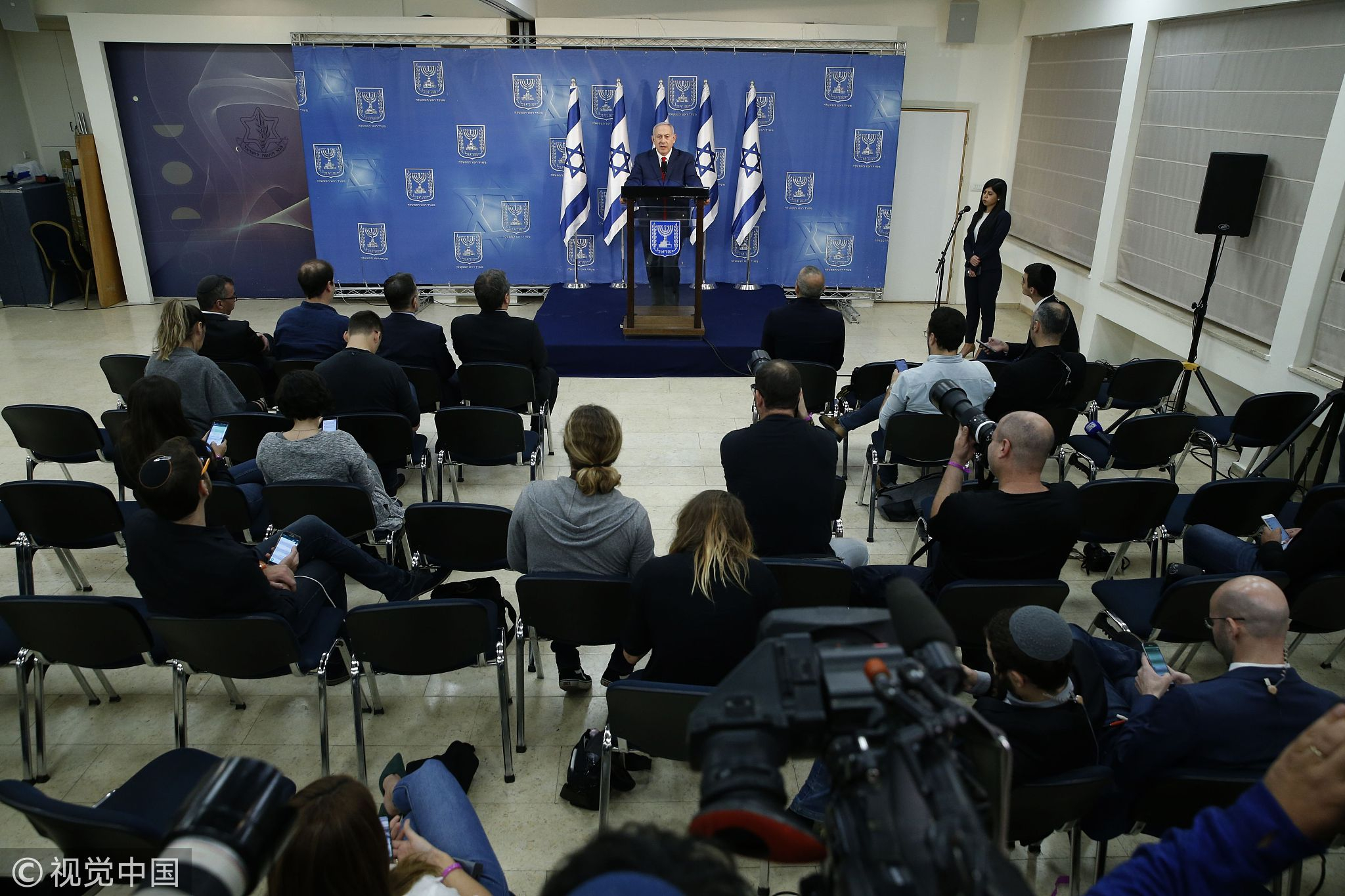
Opinions
22:47, 26-Dec-2018
Opinion: Will Netanyahu continue as prime minister in 2019?
Updated
22:05, 29-Dec-2018
Wang Jin

Editor's note: Wang Jin is a research fellow at the Charhar Institute and a research fellow at the Northwest University of China. The article reflects the author's opinion, and not necessarily the views of CGTN.
The upcoming Israel election in 2019 might witness a major competition between different political factions and blocs. Early polls predict an easy win for Israeli Prime Minister Benjamin Netanyahu with his Likud party becoming the biggest party in the next Knesset (Israeli Parliament).
The cabinet currently led by Netanyahu was formed after the election in 2015 and was once perceived as a "short-term" or "temporary" cabinet, largely because his coalition only enjoyed a very narrow majority in the Knesset.
Although Netanyahu had been trying to gain the support from other parties, especially the support from the left-wing Labor party by appointing Isaac Herzog, leader of the Labor party to be the foreign minister, his efforts have only ended in vain.

Israel's Prime Minister Benjamin Netanyahu arrives to deliver a statement to the members of the media in Tel Aviv, Israel, November 18, 2018. /VCG Photo
Israel's Prime Minister Benjamin Netanyahu arrives to deliver a statement to the members of the media in Tel Aviv, Israel, November 18, 2018. /VCG Photo
Even after his cabinet came into formation, Netanyahu still faces competition and challenges from his own ministers. The education minister, Naftali Bennett, who was also the leader of the right-wing political party, the Jewish Home Party (Habayit Hayehudi), has challenged the leadership of Netanyahu on many occasions through expressing his own coercive and hardline opinions over Israeli foreign policy.
Meanwhile, Avigdor Lieberman, the leader of "Our Home Israel" party (Yisrael Beiteinu), also challenged the leadership of Netanyahu after Lieberman was invited by Netanyahu into the coalition and was made the defense minister.
Lieberman resigned from the post of defense minister months ago to show his opposition to Netanyahu's "weakness" and "hesitation" against the threats in southern Israel from Hamas "terrorists" in Gaza. After Lieberman's resignation, Netanyahu's coalition only enjoys 61 seats in the 120-seat Knesset, and it is just a question of time that his government collapses.
In addition, Netanyahu also faces the challenges from the investigations by Israeli police and justice departments. Israeli police suspect that Netanyahu, his wife Sara and his son Yair, might be involved in corruption and abuse of power for personal gains while some of his close assistants were arrested in 2017 and 2018.
Although the case is still under investigation, Netanyahu is still enjoying public support at home, the corruption investigation against Netanyahu's family is the "Sword of Damocles" for his political career.
However, in 2019, Netanyahu is still the most likely winner in the upcoming election. On the one hand, the Likud might continue its majority seats in the next parliament, although some of his challengers like former minister of internal affairs Gideon Sa'ar is trying to shake Netanyahu's number one post inside Likud, Netanyahu is still likely to continue his leadership inside Likud.
On the other hand, the government of Israel has always been established with consensus and compromise between different political parties after the elections with the aim of forming majority coalition inside parliament. Netanyahu is one of the few proper candidates that may be able to unite various political parties with different or even opposite political ideologies and principles.

Israeli Prime Minister Benjamin Netanyahu speaks to the press in the coastal city of Tel Aviv, Israel, November 18, 2018. /VCG Photo
Israeli Prime Minister Benjamin Netanyahu speaks to the press in the coastal city of Tel Aviv, Israel, November 18, 2018. /VCG Photo
Naftali Bennett is too right wing to gain enough support from central and left parties, Yair Lapid and his "future" party (Yesh Atid) might be too central to win enough votes from Israeli public to dominate the Knesset, while the Lieberman's party might be too weak for him to compete for the prime minister post.
The investigations against Netanyahu might take longer than expected. To investigate a politician like Netanyahu who has been the prime minister (on and off) for the past two decades is a difficult task for anyone, and it is important to gather enough evidence before the case could be even sent to the attorney general.
And it will take even longer before the case is sent from the attorney general to the supreme court, and much longer before the final judgment is made by the court. Netanyahu will have enough time to prepare his campaign in the upcoming election and might continue his prime ministership in the next term.
Therefore, after the election is held in April 2019, it is very likely that Netanyahu will continue as Israel's prime minister and may also become the country's longest-serving leader since the establishment of modern Israel in 1948.
(If you want to contribute and have specific expertise, contact us at opinions@cgtn.com)

SITEMAP
Copyright © 2018 CGTN. Beijing ICP prepared NO.16065310-3
Copyright © 2018 CGTN. Beijing ICP prepared NO.16065310-3